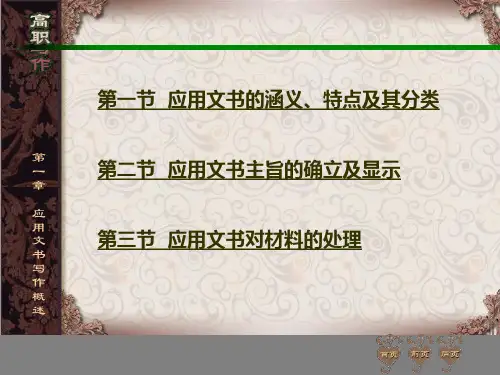2019级专升本考研辅导讲座.ppt
- 格式:ppt
- 大小:1.62 MB
- 文档页数:17
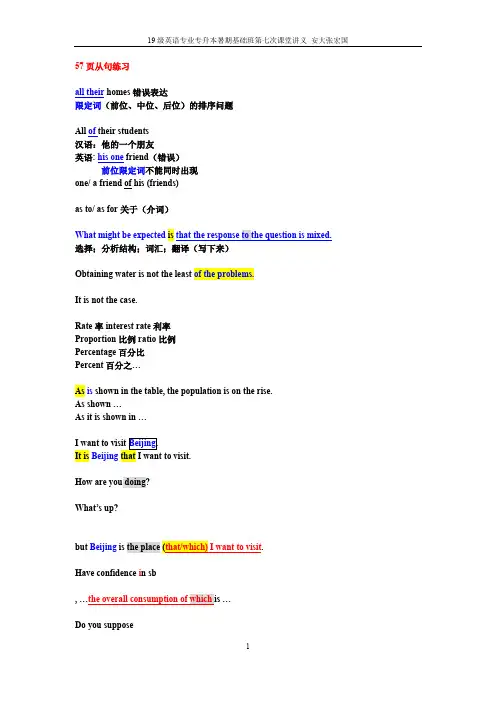
57页从句练习all their homes错误表达限定词(前位、中位、后位)的排序问题All of their students汉语:他的一个朋友英语: his one friend(错误)前位限定词不能同时出现one/ a friend of his (friends)as to/ as for关于(介词)What might be expected is that the response to the question is mixed.选择;分析结构;词汇;翻译(写下来)Obtaining water is not the least of the problems.It is not the case.Rate率interest rate利率Proportion比例ratio比例Percentage百分比Percent百分之…As is shown in the table, the population is on the rise.As shown …As it is shown in …It is BeijingHow are you doing?What’s up?but Beijing is the place (that/which) I want to visit.Have confidence i n sb, …Do you supposeYou suppose, I think, you knowDo sth with sth处理Deal with sth处理的提问whatDeal with的提问HowIt takes sb sth to do sth.It takes sth to do sth形式主语真正主语By sth, I mean…倒装句(一)全部倒装:谓语+主语(二)部分倒装—be动词/情态动词/助动词+主语+其他谓语部分(类似疑问语序)1.否定词提前seldom, never, little, hardly, not until…正常语序倒装语序.1)hardly/scarcely/barely…when…; no sooner …than…一…就…我一走进电影院,电影就开始了。
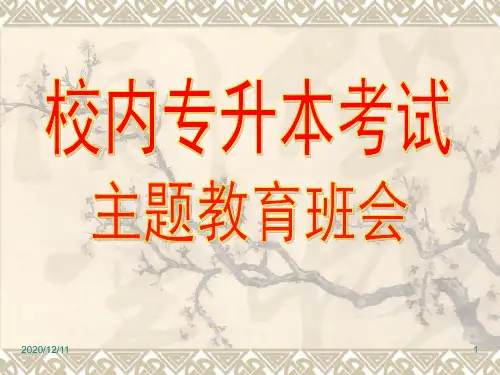

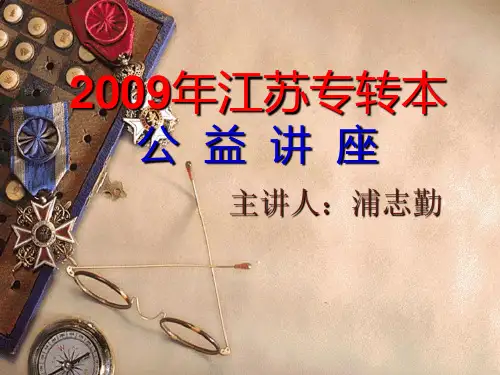
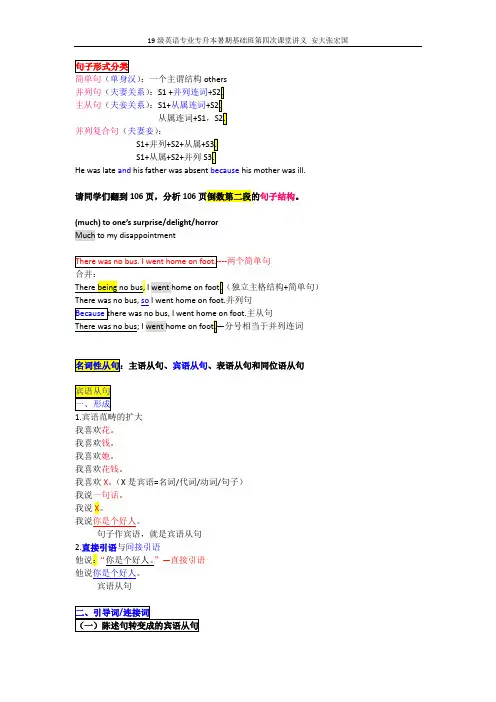
简单句(单身汉):一个主谓结构并列句(夫妻关系):S1 +并列连词主从句(夫妾关系):S1+从属连词从属连词+S1,并列复合句(夫妻妾):S1+并列+S2+从属S1+从属+S2+并列He was late and his father was absent because his mother was ill.请同学们翻到106页,分析106页倒数第二段的句子结构。
(much) to one’s surprise/delight/horrorMuch to my disappointment两个简单句合并:There being no bus, I went home on foot.+简单句)There was no bus, so I went home on foot.并列句主从句There was no bus; I went home on foot.分号相当于并列连词宾语从句、表语从句和同位语从句1.宾语范畴的扩大我喜欢花。
我喜欢钱。
我喜欢她。
我喜欢花钱。
我喜欢X。
(X是宾语=名词/代词/动词/句子)我说一句话。
我说X。
我说你是个好人。
句子作宾语,就是宾语从句2.直接引语与间接引语他说:“你是个好人。
”—直接引语他说你是个好人。
宾语从句他说:“你是个好人。
”宾语从句The teacher said 宾语从句在引导名词性从句时,that引导的从句是陈述句,that仅仅是引导词/连接词,在从句中不做成分,that也没有意思;在宾语从句中,第一个引导词that可以省略。
that宾语从句1.指示代词“那”This is your book and that is mine.2.指示形容词This book is yours and that book is mine.3.作副词“那么地”The question is this /that difficult.这么/那么4.作连接代词,引导名词性从句I agree (that) college students can take part-time jobs.5.作关系代词,引导定语从句The student that is talking to the teacher is my brother.你是学生吗?Are you a student?他问:“你是学生吗?”—直接引语He asked, “Are you a student?”他问你是不是学生。
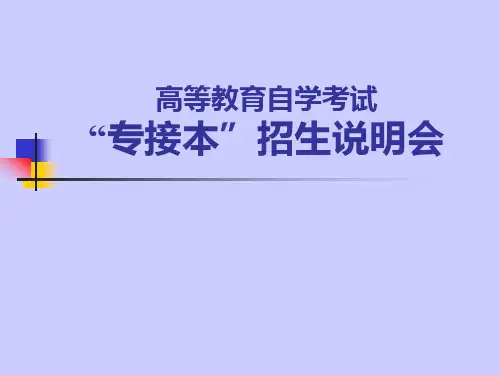
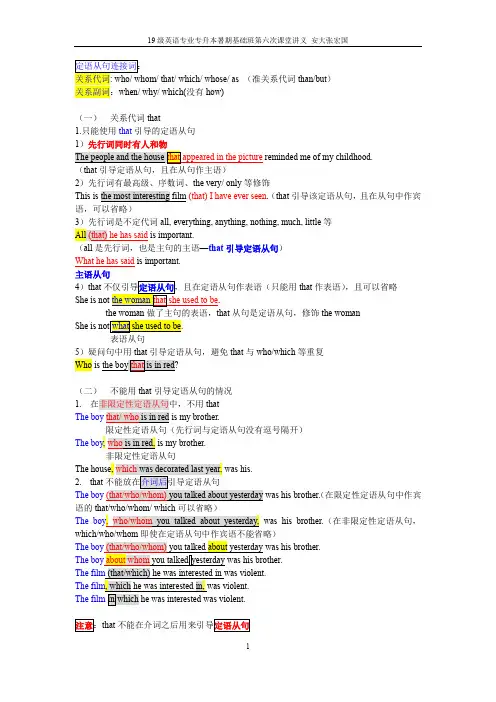
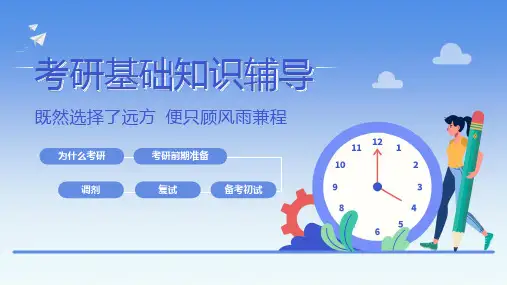
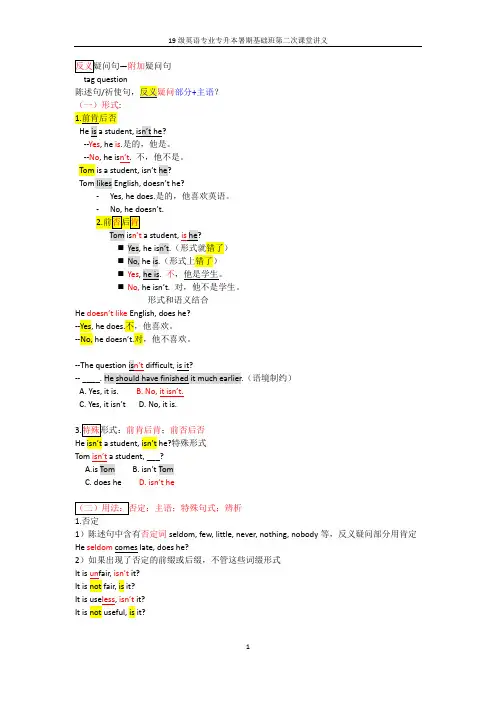
—附加疑问句tag question陈述句/部分+主语?(一)形式:--Yes, he is.是的,他是。
--No, he is n’t. 不,他不是。
Tom is a student, isn’t he?Tom likes English, doesn’t he?-Yes, he does.是的,他喜欢英语。
.Yes, he isn’t.No, he is.(形式上错了)⏹Yes, he is. 不,他是学生。
⏹No, he isn’t. 对,他不是学生。
形式和语义结合He doesn’t like English, does he?--Yes, he does.不,他喜欢。
--No, he doesn’t.对,他不喜欢。
(语境制约)A. Yes, it is.B. No, it isn’t.C. Yes, it isn’tD. No, it is.前肯后肯;前否后否t a student, isn’t he?特殊形式Tom isn’t a student, ___?A.i s TomB. isn’t TomC. does heD. isn’t he1.否定1)陈述句中含有否定词seldom, few, little, never, nothing, nobody等,反义疑问部分用肯定He seldom comes late, does he?2)如果出现了否定的前缀或后缀,不管这些词缀形式isn’t it?It is not fair, is it?isn’t it?It is not useful, is it?1)不定代词something, everything, nothing, anything,反义疑问部分主语用代词it代替Everything goes well, doesn’t it?is correct, is it?2)不定代词everybody, nobody, somebody, anybodyEverybody is here, isn’t he?(传统语法)Everybody is here, aren’t they?Nobody is here, are they/ is he?3)主语是II am a student, aren’t I?I wish to go there, may I?3.特殊句式you,被省略,表达命令(不能用don’t you)Don’t close the door, will you?Let’s go there, shall we?’t there? (不能用isn’t it)There will be a tree in front of the room, won’t there?Here is a piece of advice for you, isn’t here?3. 并列句—反义疑问句取决于后面的句子—就近原则He is absent, isn’t he?简单句His mother is ill, isn’t she?简单句isn’t she?并列连词“因为”—并列句isn’t she?并列句his mother is ill, isn’t he?引导从句—主从句,动词是think/ suppose等主观性动词,后面接宾语从句时,反义疑问句取决于宾语从句I think that he is right, isn’t he?I do n’t think that he is right, is he?think that she is right, does he? (不能取决于从句,而是取决于主句,因为主语不1wouldn’t he?hadn’t he?wouldn’t he?hadn’t he?2)区分have是实义动词动词还是助动词He has(hasHe has a wonderful time in Hefei, doesn’t he?(has是实义动词)He has lunch at 12:00, doesn’t he?He has finished his lunch, hasn’t he?(has是助动词,构成完成时)3)区分need/dare是实义动词还是情态动词Need /dare to do sth实义动词Need/dare do sth情态动词He needs 100 yuan, doesn’t he?实义动词He need pay 100 yuan, needn’t he?情态动词Must do/ must be doing 对现在的猜测Look! The light is on. Tom must be studying in the classroom now, isn’t he?Look. Tom is studying in the classroom now, isn’t he?didn’t it?对应的事实是:He must have been to Japan,(对应的事实是:He has been to Japan, hasn’t he?)couldn’t /cannot have donehave rained last night, did it? (对应的事实:it didn’t rain last night, did it?)祈使句—表达命令What+名词(核心词)How+形容词/副词/句子(一)what+名词(核心词)what+形容词+名词(如果形容词和名词之间没有其他词,用what;如果形容词和名词之间有其他词the/an/a/ his…则用How)(it is)!(it is)!—单数名词How hot (it is)!What diligent you are!are!What hot weather it is!不可数名词How slowly he runs!(how+副词)How time flies!How +句子What fun!很有趣!(fun是不可数名词)How funny!很滑稽!(funny是形容词)What a mess!1989Face eye nose earX2 smaller than X功能分类1.简单句(一个主谓结构)2.并列句—并列连词3.主从句—从属连词4.并列复合句(一)简单句语言是思维的外在形式—言由心生—思维反映物质世界的—运动是绝对的“运动”在语言中是动词,作谓语;“运动的主体(发出者)”在语言中是主语;“运动的承受者”是语言中的宾语但是不是所有的动作都有承受者;有些动作没有承受者,这些动词就是不及物动词(没有对象)我游泳。

